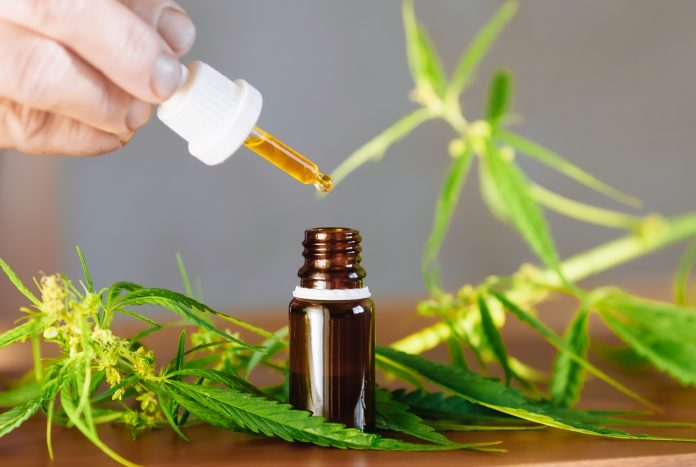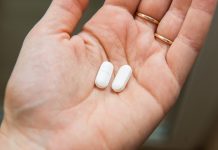Recent research commissioned by the Centre for Medicinal Cannabis has revealed that the UK CBD market is worth £300 million
Cannabidiol, known more commonly as CBD, has seen a notable surge in popularity as a wellness product in recent years. In a study commissioned by the Centre for Medicinal Cannabis, the UK CBD market was shown to be worth £300 million, and its double-digit growth each year has led to market value expectations of almost £1 billion by 2025. Clearly, CBD is not a fleeting trend.
What is CBD?
CBD is a naturally occurring compound found in the cannabis plant, most strongly concentrated in its resinous flower. It is a safe and non-addictive substance once extracted from the plant. It shouldn’t be confused with the other main active substance in cannabis plants, tetrahydrocannabinol (THC), that produces the ‘high’ that is sought by recreational cannabis users. CBD oil for medicinal or therapeutic use is made up of CBD concentrate extracted from hemp plants mixed with a ‘carrier oil’ such as olive or coconut oil, and the concentration of CBD is controlled. It is legal to sell CBD oils as wellness supplements if they meet Home Office requirements for controlled substances such as THC and they have novel food authorisation (more on that later). Currently, CBD oils cannot legally contain a detectable amount of THC. You can purchase CBD products without a prescription in pharmacies, online and in health food shops, in a variety of forms, from oils and tinctures to chocolate bars and cosmetics.
Who’s using CBD products:
- 6 million UK adults have consumed a CBD product in the past year with 11% of the population consuming a CBD product in the last year.
- Adults over 55 are the most frequent users: 31% of CBD users are 55+
- £24 is the average monthly spend amongst UK CPD oil users
- Over 70% of UK consumers are purchasing CBD tinctures/oils or capsules
What are the potential benefits of CBD?
Some studies have suggested that depending on form and dosage, CBD oils can help with pain relief, anxiety, stress, acne, inflammation, nausea, asthma, insomnia, concentration and muscle recovery. An important study conducted in 2011 showed that in a social speaking simulation as part of a clinical trial, participants who had received CBD oil showed notably lower anxiety levels than those who had received a placebo. In a 2018 critical review report from the World Health Organisation (WHO), CBD oil was shown to be most advanced in epilepsy treatment.
In the same WHO report, it was reported that to date there is no evidence of any public health or abuse-related problems associated with the use of pure CBD. There is little long-term safety data available currently, but the most commonly reported side effects of CBD are tiredness, diarrhoea and changes in appetite. This is again dependent on dosage and the specific product used, and requires more clinical research.
Currently, CBD oils can only be sold as food supplements rather than licensed medicines due to a lack of resounding clinical evidence, and as a result, they cannot make health claims on their labels.
What is a novel food?
The most important new legal development has been the European Union’s Novel Food regime, which lead to the classification of all extracted cannabinoids as “novel” in January 2019. Novel foods are foods which have not been widely consumed by people before 1997 – examples include cholesterol-lowering spreads or foods new to the UK market such as chia seeds. The Food Standards Agency (FSA) has declared that it wants all CBD products to be classified as novel foods as an industry standard and is currently encouraging UK manufacturers to submit applications. So, how does a consumer know if it’s an official novel food or just a novelty?
Difficulties surrounding CBD, including laws and regulation
Since CBD products started appearing in high street health food shops and pharmacies only a few years ago, there has been explosion of products on the shelves. Currently, with a lack of an official industry standard, there’s a bewildering range of products on offer. As a relatively new retail category, it is difficult for shoppers to know which products they should be choosing and how much they should be paying. Whilst CBD in its isolated form is completely legal, there are challenges around levels of illegal cannabinoids. It is imperative companies follow the law when formulating products to ensure these levels are within the parameters set by the Home Office. This brings into light the need for standardised testing methodologies between testing laboratories to ensure there is harmony throughout the industry.
What’s in a label?
CBD products not only come in a variety of doses, sizes and prices – there is some concern that currently product labelling can be inaccurate and misleading. Key lab tests in June, undertaken as part of the Centre for Medicinal Cannabis’ 2019 report CBD in the UK, exposed the following statistics concerning UK high-street CBD oil products:
- 62% products studied didn’t contain the CBD content promised on label
- One product which retails at £90 was found to contain 0% CBD
- Almost half (45%) of products tested were found to contain a detectable amount of THC, making them technically illegal in the UK
- One product contained 3.8% ethanol making it an alcoholic beverage
- Only 11/29 (38%) of the products were within 10% of the advertised CBD content and 11/29 (38%) had less than 50% of the advertised CBD content
This data indicates that one of the main issues facing the CBD market is the lack of regulation and misleading product labelling, highlighting low industry standards. That is, there are currently no quality control, manufacturing or labelling standards for the UK market. A recent YouGov poll by CMC, reveals that consumers are also concerned: over a quarter (26%) of those surveyed said that information on the product itself was a key influencer – with people wanting clear labelling about contents and how the CBD product was produced.
In addition, the fact that cannabis is illegal has made it more difficult to conduct scientific research into its potential health benefits; some CBD labs are unfamiliar with the chemistry of cannabis so in some instances, incorrect amounts of CBD and/or THC are inevitably found high-street products.
Dr Parveen Bhatarah, CMC Regulatory and Compliance Lead, comments: “We know that there is a growing interest amongst consumers in the CBD sector and there has been an explosion of products stocked online and in high street shops. This can lead to confusion about the best product to buy–most importantly what strength/dosage and what price. We want shoppers to feel confident about the quality of the CBD products on offer in retail – and reassurance that they are getting what they pay for.”
Overcoming consumer trust issues
A new Association for the Cannabinoid Industry (ACI) was launched just last week (8th November) at an event in London to help foster a legally compliant, socially responsible and innovative UK CBD industry. Key players in the sector came together for this inaugural conference to be introduced to the 7 pillars of the ACI Quality Charter and to hear from numerous experts in the field. Key speakers included Greer Deal and Dr Sarah Gaunt, Global Regulatory Services, Dr Parveen Bhatarah, Regulatory and Compliance Lead, Centre for Medicinal Cannabis (CMC) and Steve Moore, Strategic Counsel, CMC.
During the event, results from a new YouGov poll (carried out on 23/24th October 2019) were revealed which showed that:
- 62% of UK adults are aware of cannabidiol (CBD) based products
- Over one in ten (16%) had bought a CBD based product
- However, 45% of those surveyed said they were not confident that all CBD products are labelled with the correct information and are properly tested by a regulatory authority
- 48% of people in the UK said they would be more likely to try CBD products if they could be certain that they had been produced to tight regulatory standards.
Ultimately, ACI Charter is working towards the introduction of a kitemark to display on CBD products to provide shoppers with reassurance that their purchase is meeting the regulations.











